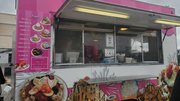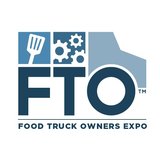Article
Onetime political refugee finds a niche in Vegas with Polish food truck
By specializing in homemade Polish food, Jerry Kozielec has been able to make a good living in Las Vegas. He began his journey to the American dream as a refugee from Communism.

October 31, 2018 by Elliot Maras — Editor, Kiosk Marketplace & Vending Times
When it comes to kielbasa and pierogi, Jerry Kozielec knows his stuff. As a refugee from Communist Poland in the early 1980s, he learned to make the best of his situation as he found his way to America.
He taught himself how to prepare food from scratch, and he perfected his own recipes for pierogi, sausage, meatloaf, cabbage, potato salad, macaroni salad and chips, all of which he now proudly serves from his King's Sausage food truck in Las Vegas.
Anyone with a taste for Polish cuisine is likely to be a fan of King's Sausage, which sells pierogis for $8, sandwiches for $9 and $10, side dishes of potato salad or macaroni salad for $3 and chips for $1.
"People know me," the 57-year-old Kozielec says with pride.
A political refugee
Kozielec was 20 years old when he decided to desert the Polish army about a month before the Communist government declared martial law in 1981. "You didn't have anything," he recalled of that difficult period.
 |
| The food truck provides a good living for Kozielec and his family. |
That never kept Kozielec from pursuing his ambitions, though. He made his way to the U.S. embassy in Germany, where he was granted asylum.
The embassy sent him to a center in Dallas, where a church organization helped him find a job as a hotel bus boy. He also attended classes to learn English.
Kozielec eventually moved to Chicago and took what jobs he could find. He worked construction and other gigs before being hired as a meat cutter at a Meijer store.
He worked his way up to store manager, but by 2012, was tired of the cold weather and moved to Las Vegas. Given his experience as a meat cutter, Kozielec reasoned he could find a job as a butcher.
Seizing an opportunity
Although Las Vegas was a rapidly growing city when Kozielec arrived in 2012, he was unable to find a job as a butcher. But that didn't stop him.
Over the years, he had perfected his skill preparing meat and pierogi from scratch, so he decided to prepare and serve sandwiches and pierogis from a food tent. "I just decided to do it," he said.
He bought a grill, a sink and a refrigerator, and he secured a business license and a health department permit. He began serving food in and around Las Vegas shopping districts.
For three years, Kozielec made a decent living selling food from his tent, sourcing his products from foodservice distributors and Costco Wholesale.
|
| Kozielec grills kielbasa in the kitchen of his food truck. |
During that time, he couldn't help but notice the growing number of food trucks in Las Vegas, and reasoned that with a truck, he would be able to serve his food at more locations.
Three years ago, he purchased a 1996 Chevrolet truck from a truck builder in New Mexico, and had the builder install a new engine and cooking appliances.
Kozielec also hired a local graphics company to make the wrap, which shows sausage and pierogis. His total investment in the truck came to approximately $60,000.
He arranged to prepare his meat in a kitchen owned by a caterer with whom he had become friends.
Finding successful locations has proven harder than expected, Kozielec said. Afternoon meal service can net anywhere from $100 to $500.
One of his anchor locations is the Tenaya Creek Brewery, which has nine rotating food trucks in its parking area. Kozielec makes it a point to be scheduled for Wednesday, when the brewery has its trivia night. Another steady location is Nellis Air Force Base near Las Vegas.
In search of good events
In the nearly three years he has had his truck, Kozielec has been testing special events, which have proven hit-and-miss. He has not participated in any of the larger Las Vegas conventions due to the high fees. He has listed his truck on the food truck finder app, Where's the Food Truck.
His biggest and most successful event has been the three-day Life Is Beautiful festival featuring art in an 18-block area of downtown Las Vegas. He credits his success to good communication by the festival organizers, and a reasonable participation cost, which he pegged at 20–30 percent of his sales.
Another event, the Great American Foodie Fest at the Sunset Station casino, did not pan out for him. There was a $1,500 fee and the event was not well organized.
Kozielec has considered opening a sandwich bistro, which would allow him to do all of his preparation and serving in one location, but he hasn't made a decision.
While Kozielec has found some aspects of the job harder than he expected and he isn't sure when he will finish paying for his investment, he is glad to be operating a food truck. The business has provided a good living for himself, his wife, Renata, and their 12-year-old son, Patrick.
He likes preparing and serving food, and, as he noted, "I'm the boss."
About Elliot Maras
Elliot Maras is the editor of Kiosk Marketplace and Vending Times. He brings three decades covering unattended retail and commercial foodservice.








